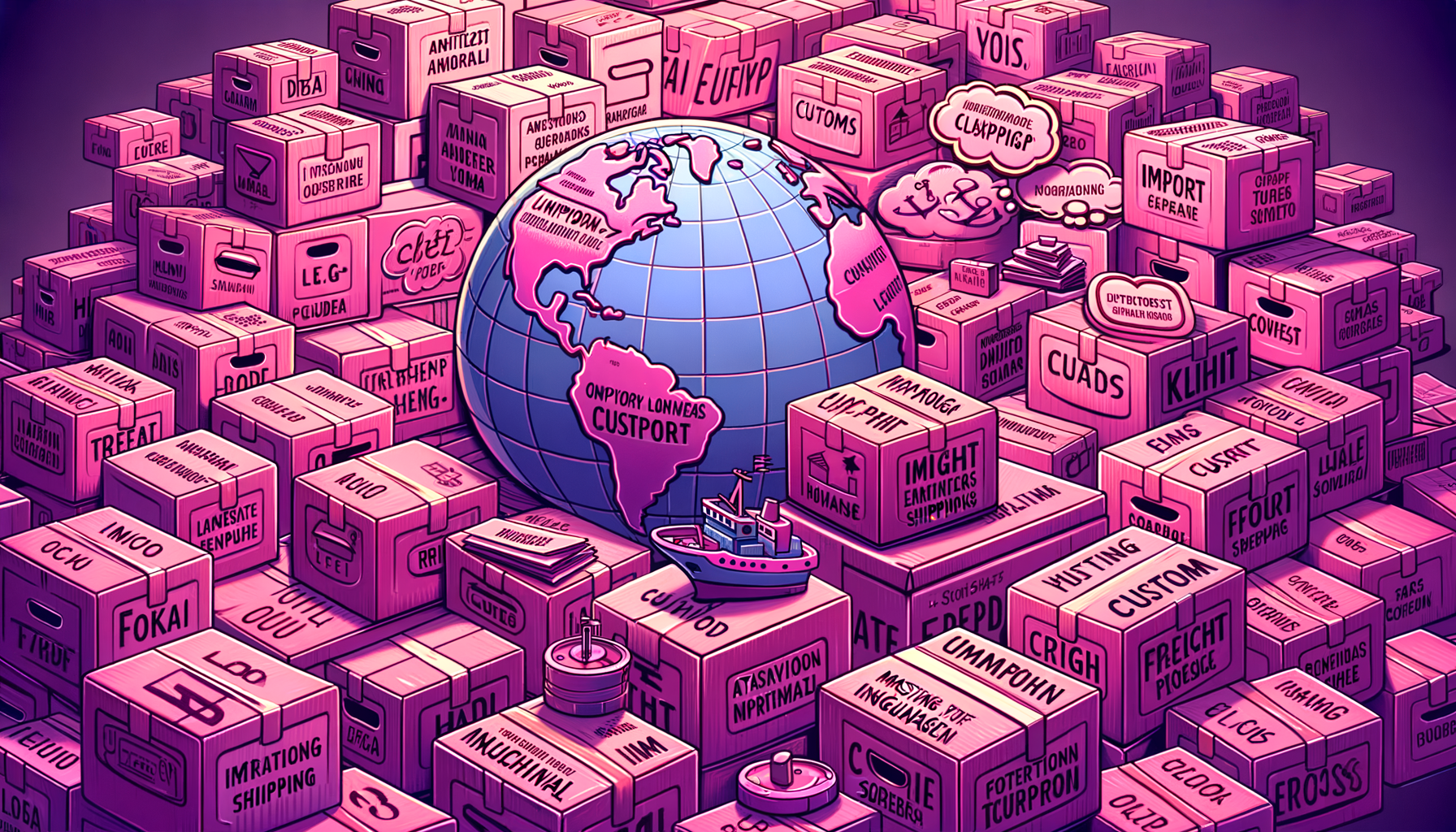 Exploring the Language of International Shipping
Exploring the Language of International Shipping
In today’s interconnected world, international shipping plays a vital role in global trade and commerce. Whether you are a business owner looking to expand your market or an individual moving to a different country, understanding the language of international shipping is key to ensuring a smooth and successful transition. In this article, we will explore the basics of international shipping, navigate the regulations and laws involved, examine the role of shipping in global supply chains, discuss technological innovations in the industry, and provide strategies for overcoming language barriers. By the end, you will have the knowledge you need to confidently navigate the world of international shipping.
Understanding the Basics of International Shipping
Before diving into the complexities of international shipping, it is important to grasp the foundational elements. Familiarizing yourself with key terms and phrases is crucial in effectively communicating with shipping agents, customs officials, and other parties involved in the process. Terms such as Incoterms, bill of lading, demurrage, and freight forwarder are just a few examples of the language you need to master. By understanding these terms and how they apply to your specific shipping needs, you can ensure that you are on the same wavelength as your shipping partners.
Accurate communication is paramount in the shipping industry. A slight misunderstanding or misinterpretation of instructions can lead to delays, extra costs, and even legal issues. It is vital to communicate clearly and precisely, leaving no room for ambiguity. Providing accurate and detailed information about your shipment, including its dimensions, weight, and contents, will help shipping agents determine the most appropriate transportation method and ensure compliance with safety regulations.
Furthermore, when dealing with international shipping, it is essential to consider the various regulations and restrictions imposed by different countries. Each country has its own set of rules regarding imports and exports, including prohibited items, duty rates, and documentation requirements. Familiarizing yourself with these regulations can help you avoid potential pitfalls and ensure a smooth shipping process.
Another critical aspect to keep in mind is the importance of packaging your goods securely for international transit. The journey your shipment takes can involve multiple modes of transportation, including trucks, ships, and airplanes, each with its own set of challenges and risks. Proper packaging not only protects your goods from damage but also plays a role in optimizing space utilization and reducing shipping costs.
Navigating International Shipping Laws and Regulations
International shipping is governed by a complex web of laws and regulations. From international trade agreements to customs regulations, understanding and complying with these legal requirements is essential for a successful shipping experience. Deciphering international trade agreements, such as free trade agreements and customs unions, enables you to take advantage of preferential trade terms and eliminate or reduce tariffs and quotas. Working closely with legal and customs experts can help you navigate the legal landscape and ensure compliance with regulations.
One crucial aspect of international shipping laws is understanding the documentation required for different types of shipments. Depending on the nature of the goods being shipped, you may need to provide specific documentation to comply with import and export regulations. This documentation can include commercial invoices, packing lists, certificates of origin, and import/export licenses. Ensuring that you have the correct documentation in place is vital to prevent delays and potential legal issues during the shipping process.
Furthermore, staying up-to-date with changes in international shipping laws and regulations is essential for businesses engaged in global trade. Regulations can vary from country to country and may be updated periodically to reflect changes in trade agreements or geopolitical circumstances. By staying informed through industry publications, legal updates, and consultations with trade experts, you can proactively adapt your shipping strategies to remain compliant and competitive in the international market.
The Role of Shipping in Global Supply Chains
Shipping plays a crucial role in global supply chains, enabling the movement of goods across borders and connecting producers with consumers worldwide. Understanding the impact of shipping on international trade can help you optimize your supply chain and make informed decisions about inventory management, transportation modes, and delivery timeframes. By embracing efficient global shipping strategies, such as consolidating shipments, utilizing intermodal transportation, and leveraging technology, you can reduce costs, improve delivery times, and enhance customer satisfaction.
One key aspect of global shipping is the concept of containerization, which revolutionized the industry in the 20th century. Standardized shipping containers allow for easy transfer between different modes of transportation, such as ships, trains, and trucks, streamlining the entire logistics process. This innovation significantly reduced cargo handling costs and time, making it a cornerstone of modern global trade.
Moreover, the development of advanced tracking systems and real-time visibility tools has transformed the way companies manage their supply chains. By utilizing GPS technology and data analytics, businesses can monitor the location and condition of their shipments in transit, enabling proactive decision-making and risk mitigation. This level of transparency not only enhances operational efficiency but also builds trust with customers by providing accurate delivery information.
Technological Innovations in International Shipping
The shipping industry has witnessed significant technological advancements in recent years. Embracing these innovations can help streamline communication, improve efficiency, and enhance the overall shipping experience. One area where technology has made a profound impact is shipping communication. From real-time tracking systems to electronic data interchange (EDI), technology has revolutionized the way information is exchanged between shipping parties. Staying up to date with the latest technological trends and leveraging them to your advantage can give you a competitive edge in the global marketplace.
Another key technological innovation transforming international shipping is the implementation of blockchain technology. Blockchain, known for its secure and transparent nature, is being increasingly adopted in the shipping industry to enhance supply chain visibility and traceability. By utilizing blockchain, shipping companies can create immutable records of transactions, leading to increased trust and reduced disputes among stakeholders. This technology also enables smart contracts, automating processes such as payments and documentation, thereby streamlining operations and reducing administrative costs.
Furthermore, the rise of Internet of Things (IoT) devices in shipping containers is revolutionizing cargo monitoring and management. IoT sensors embedded in containers provide real-time data on variables like temperature, humidity, and location, ensuring the integrity and safety of goods during transit. This level of visibility not only helps in preventing spoilage or damage to sensitive cargo but also allows for proactive decision-making to optimize shipping routes and schedules. As the shipping industry continues to embrace these technological innovations, the future of international shipping looks promising with increased efficiency, transparency, and sustainability.
Overcoming Language Barriers in International Shipping
As international shipping involves dealing with individuals from different cultural and linguistic backgrounds, language barriers can sometimes pose challenges. However, with effective communication strategies, these barriers can be overcome. In multilingual environments, it is crucial to establish clear channels of communication, including the use of interpreters or translators when necessary. Investing in language training for your team members or collaborating with shipping partners who have language proficiency can also facilitate smooth communication throughout the shipping process. Additionally, the use of technology such as translation apps and software can help bridge language gaps and ensure accurate understanding.
Moreover, understanding cultural nuances and communication styles can play a significant role in overcoming language barriers in international shipping. Different cultures have varying levels of directness in communication, which can impact how messages are conveyed and received. For example, some cultures may value indirect communication to maintain harmony, while others prefer straightforward and explicit language. By being aware of these cultural differences and adapting communication styles accordingly, shipping professionals can navigate language barriers more effectively and build stronger relationships with international partners.
Furthermore, establishing trust and rapport with individuals from diverse linguistic backgrounds is essential in overcoming language barriers. Building personal connections through active listening, empathy, and cultural sensitivity can help foster mutual understanding and collaboration. By investing time and effort in relationship-building activities, such as cultural exchange programs or team-building exercises, shipping professionals can create a supportive environment where effective communication can thrive, transcending linguistic differences.
Conclusion: The Path to Mastery in International Shipping Language
In conclusion, mastering the language of international shipping is vital for anyone involved in global trade or planning an international move. By understanding the basics, navigating the legal landscape, appreciating the role of shipping in global supply chains, embracing technological advancements, and overcoming language barriers, you can navigate the complexities of international shipping with confidence. Armed with knowledge and practical tips, you can take control of your upcoming international shipping journey and make informed choices that will contribute to your success in the global marketplace.
